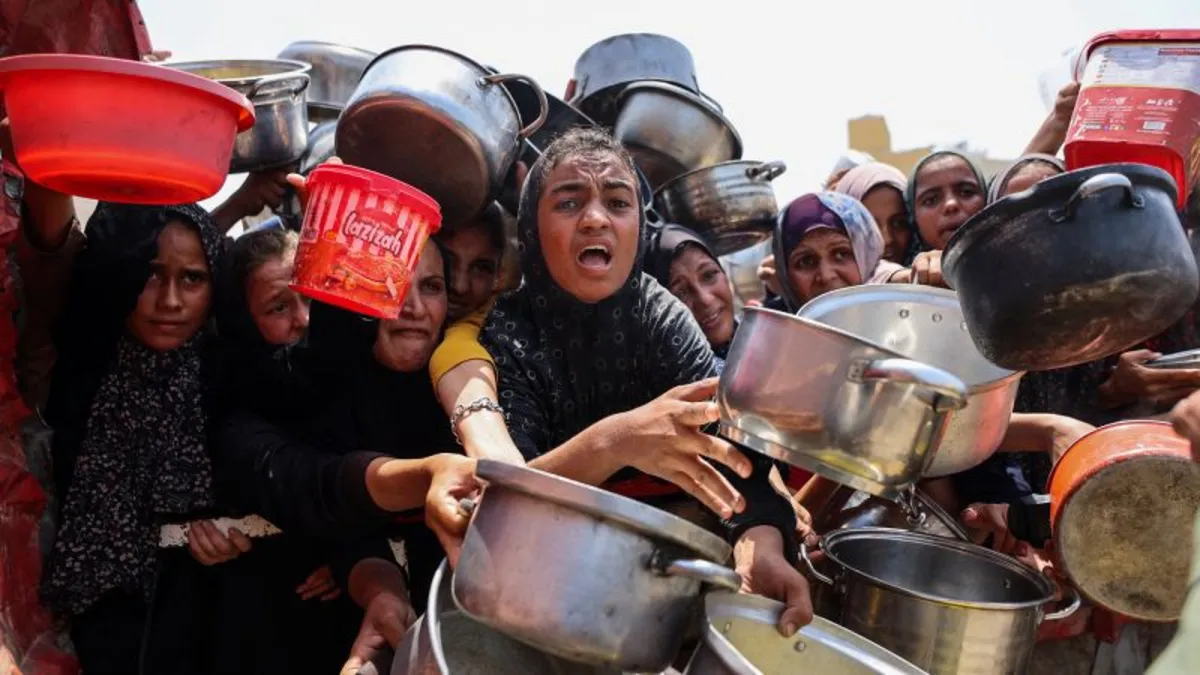
Parts of Gaza are officially experiencing famine, as reported by a United Nations-backed initiative on Friday. This alarming situation is expected to worsen, highlighting the dire humanitarian crisis that has intensified over nearly two years of ongoing conflict. Throughout this period, Israel has periodically restricted or completely cut off the entry of crucial aid to the beleaguered enclave, exacerbating the suffering of its residents.
Tragically, some individuals have succumbed to starvation, while others have lost their lives in desperate attempts to access aid at distribution sites operated by the Gaza Humanitarian Foundation (GHF). This foundation was established to replace a UN system that has faced criticism from Israel. The report by the Integrated Food Security Phase Classification (IPC) confirmed that famine conditions now exist in the Gaza Governorate, which includes Gaza City. This area is currently the focus of a significant new Israeli offensive.
The IPC report warns that “malnutrition threatens the lives of 132,000 children under five through June 2026,” including 41,000 severe cases, which represents a doubling of figures from May. This highlights the urgent need for humanitarian intervention to prevent further loss of life.
In response to the IPC report, the Coordination of Government Activities in the Territories (COGAT)—the Israeli agency responsible for aid distribution into Gaza—rejected the findings ahead of their release. COGAT contended that the report relies on “partial, biased data and superficial information originating from Hamas.” They argued that the IPC's “one-sided approach” fails to recognize the extensive humanitarian efforts made in Gaza and disregards information provided by Israel.
COGAT further asserted that the “overall trend has shifted” in Gaza, despite their claim that Hamas continues to exploit humanitarian aid. According to their statistics, over 100,000 trucks of aid, including food, medical supplies, fuel, and shelter equipment, have entered Gaza since the beginning of the conflict.
Despite COGAT's statements, various humanitarian organizations and the UN, along with disturbing testimonies and images from Gaza, present a starkly different reality. US President Donald Trump recently acknowledged the existence of “real starvation” in Gaza, directly contradicting Israeli Prime Minister Benjamin Netanyahu's claims that no starvation is occurring.
During a recent news briefing, Tom Fletcher, the UN emergency relief coordinator, emphasized the importance of the IPC report, urging the global community to read it thoroughly. He stated, “Read it in sorrow and anger, not as words and numbers but names and lives. Be in no doubt that this irrefutable testimony. It is a famine, the Gaza famine. The famine that we could have prevented if we were allowed. Yet food stacks up at borders because of systematic obstruction by Israel.”
Media outlets such as CNN have reported extensively on the hunger crisis in Gaza. Last month, a heartbreaking report detailed the death of 4-year-old Razan Abu Zaher, who tragically died from complications related to hunger and malnutrition. Her skeletal remains were discovered in a hospital in central Gaza, underscoring the urgent need for humanitarian assistance. Additionally, two more starvation-related deaths were reported by the Ministry of Health, bringing the total number of fatalities due to malnutrition to 271, which includes 112 children.
According to the IPC system, which employs a five-phase scale to assess food insecurity severity, a famine can only be officially declared if specific conditions are met. These criteria include: at least 20% of households facing extreme food shortages, 30% or more of children being acutely malnourished, 15% of children suffering from acute malnutrition based on physical measurements, and a minimum of 2 in every 10,000 people dying daily due to starvation or the combined effects of malnutrition and disease.
As the situation in Gaza continues to deteriorate, the international community must respond urgently to address this humanitarian crisis and provide the necessary support to those in desperate need.